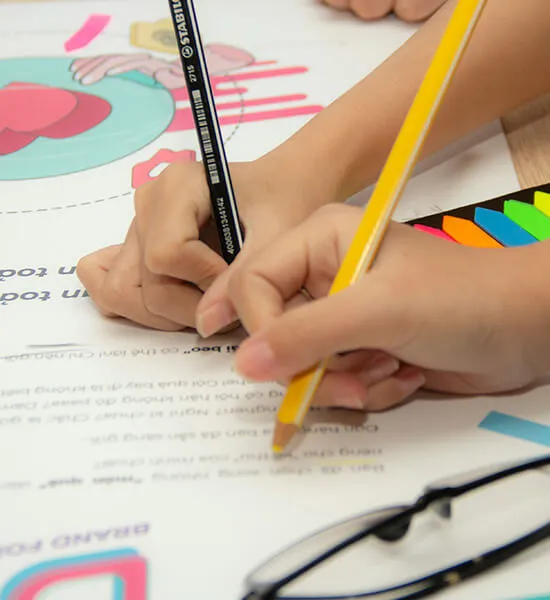Receiving a Reading Disorder Diagnosis OKC
Why they matter and how they help.
What to Know About Your Child’s Reading Disorder Diagnosis OKC

If your child has a reading disorder, like dyslexia, it impacts their ability to read and understand written text. A formal reading disorder diagnosis OKC does much more than identify your child’s reading disorder – it can open doors to targeted interventions and meaningful support that help them thrive.
In addition to providing you with clarity on your child’s specific challenges, a diagnosis can provide the foundation for requesting helpful accommodations for your child at school, such as extra time on assignments or assistive technology. This support can help your child build confidence and achieve their full academic potential, especially with an early diagnosis.
If you are seeking a diagnosis for your child, please get in touch.
Why a Reading Disorder Diagnosis OKC Is Important
In the classroom, children with a reading disorder, such as dyslexia, may struggle with reading aloud, understanding written instructions, and completing assignments. This may result in frustration, lower self-esteem, and reluctance to participate in activities.


These challenges often extend beyond school. The symptoms of dyslexia can impact activities like reading game instructions, writing texts to friends, or ordering from restaurant menus.
A formal diagnosis can be the first step in implementing support, like a 504 plan or IEP, that targets specific areas of need, such as decoding, fluency, or comprehension. The skills, accommodations, and resources available through this can help a child with dyslexia overcome challenges, build confidence, and develop the skills they need to thrive both academically and socially.
Understanding Diagnoses and Educational Support at School
A formal dyslexia diagnosis may lead to educational supports being put in place by your child’s school, such as a 504 or IEP. Both provide essential accommodations, but they serve different purposes. For children with a reading disorder, receiving these accommodations can alleviate frustration and create an environment where they can thrive.
Understanding IEPs
An Individualized Education Program (IEP) is a personalized plan designed to support students with learning challenges, such as dyslexia or developmental language disorder. It outlines specific goals, accommodations, and services tailored to meet your child’s unique educational needs.
Understanding 504 Plans
A 504 Plan provides accommodations to ensure students with physical or learning challenges, such as dyslexia, have equal access to education. These plans focus on removing barriers in the general education setting through modifications like extra time on tests or adjusted classroom strategies.
Will a Diagnosis Always Lead to Educational Support?
A dyslexia diagnosis can help your child’s school understand their specific needs, ensuring that the right strategies and support are put in place to foster their growth and confidence. However, while a private diagnosis provides evidence and valuable insights into your child’s educational needs, it does not automatically guarantee that a school or other entity will implement an educational support plan.
Your child’s school will review the evaluation results and determine their eligibility based on specific criteria set forth by the IDEA, which are different from clinical criteria.

Educational Inspiration is here to help!
Move Forward With Confidence
If your child is struggling with reading or showing signs of a reading disorder, such as dyslexia, taking action early can make all the difference. At Educational Inspiration, we are here to provide the clarity you need to effectively advocate for your child throughout their learning journey.
Here, we use an integrative approach to assessments, combining family insights with standardized testing and observations to truly understand your child’s unique needs. Once our evaluation is complete and our diagnosis is determined, we will meet with your family to discuss our findings and recommended next steps.
If you are seeking a professional reading disorder diagnosis OKC for your child, please contact us to schedule an assessment or visit our Evaluation page to learn more about our process.
FAQs
What qualifies as a reading disorder?
A reading disorder is identified when a child has persistent difficulty with skills such as decoding, reading fluency, spelling, or comprehension that are not explained by a lack of instruction or intelligence.
What are the possible causes of a reading disorder?
A reading disorder is usually neurodevelopmental, which means it stems from how the brain processes language and written words. It often has a genetic component and is not the result of a child’s effort, motivation, or exposure to reading.
How is a reading disorder diagnosed?
A reading disorder is diagnosed through a comprehensive evaluation that includes standardized assessments, observations, and family background information. This process helps identify specific strengths and challenges related to reading and language skills.
How do I get my child tested for a reading disorder?
Testing usually begins by scheduling a professional evaluation with a qualified specialist. During the assessment, your child completes a series of activities designed to measure reading, language, and related skills in a supportive environment.
Is dyslexia considered a reading disorder?
Yes, dyslexia is a reading disorder that primarily affects reading accuracy, fluency, and spelling. It is a language-based learning difference and varies in how it presents from one child to another.
When should a child be tested for a reading disorder?
A child should be tested when ongoing reading difficulties are noticed, such as trouble sounding out words, slow or inaccurate reading, or frustration with reading tasks. While testing can be done at any age, earlier identification allows for earlier support.
